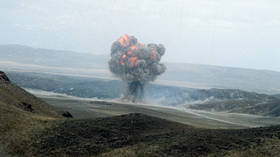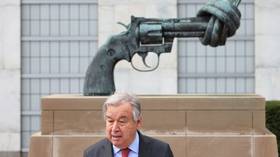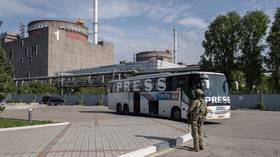Russia rejects ‘nuclear saber-rattling’ accusations

Russia’s doctrine for the use of nuclear weapons is very clear and the current conflict in Ukraine does not meet any of its criteria, Moscow’s envoy to the UN nonproliferation review conference said on Tuesday. Alexander Trofimov also rejected a series of claims by US Secretary of State Antony Blinken as “utterly unfounded” speculation, perhaps intended to fuel “anti-Russian hysteria.”
“We would also like to strongly reject the utterly unfounded, detached from reality and unacceptable speculations that Russia allegedly threatens to use nuclear weapons, particularly in Ukraine,” Trofimov said on Tuesday, using the right of reply to address the Non-Proliferation Treaty (NPT) review conference in New York.
Russia’s nuclear doctrine is “explicitly clear,” envisioning their use only in the event of attacks involving weapons of mass destruction or a conventional aggression endangering the state’s existence, Trofimov said. “Neither of these two hypothetical scenarios is relevant to the situation in Ukraine.”
The Russian diplomat condemned “unscrupulous interpretations” of Moscow’s decision to put its nuclear deterrent on alert earlier this year, saying the grounds for it were “confrontational actions and provocative statements by representatives of Western nuclear powers about the possibility of NATO interference in military actions in Ukraine against Russia.”
While he did not name the accusers, Trofimov’s response specifically addressed the claims by US Secretary of State Antony Blinken, who on Monday accused Russia of “reckless, dangerous nuclear saber-rattling,” to “those supporting Ukraine’s self-defense.”
Blinken also accused Russia of violating the 1994 Budapest Memorandum, which guaranteed Ukraine’s independence in exchange for giving up Soviet nuclear weapons left on its territory.
According to Trofimov, “Russia has strictly fulfilled its obligations” under the memorandum, “including in recent months,” while Kiev’s statements about obtaining nuclear weapons “call into question the viability” of the 1994 document. Ukraine has also violated the memo for “many years,” in particular regarding provisions against “aggressive nationalism and chauvinism,” he added.
Blinken’s interpretation of the Russian leadership’s statements as a threat to use nuclear weapons in Ukraine is “unscrupulous and does not stand up to any criticism,” Trofimov argued. They were directed at NATO, as a way to deter the West from direct aggression against Russia in the context of the Ukrainian crisis, he added, noting that the West has already “moved towards a fierce hybrid confrontation and dangerously balances on the edge of open military clash.”
Such a move would be able to trigger one of the two emergency scenarios described in our doctrine. We obviously stand for preventing this, but if Western countries try to test our resolve, Russia will not back down.
The Russian mission to the UN has already objected to Blinken’s accusation that Moscow is using the Zaporozhye nuclear power plant as a “human shield,” pointing out on Monday evening that the Ukrainian side has been targeting the plant, Europe’s largest, with artillery and explosive drones in recent weeks.
Trofimov also felt compelled to note that “only one country in the world actually used nuclear weapons – it was the United States, which dropped atomic bombs on Hiroshima and Nagasaki, even though this has not reasons from the point of view of military expediency and was in fact a testing of weapons of mass destruction on Japanese cities and their inhabitants.”














